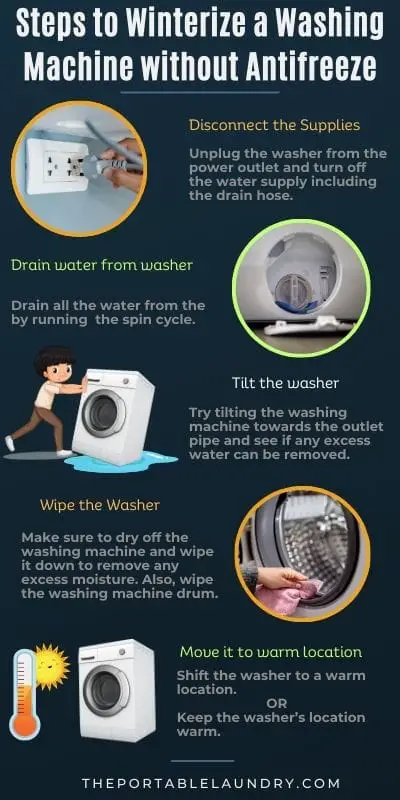Winterizing your washing machine is an essential step to ensure that your appliance stays in good working condition throughout the winter season.
Whether you are storing your washing machine in the garage or traveling with it during winter, taking the time to winterize it will save you from a costly repair bill down the road.
Before we could jump into the nitty-gritty of how to winterize a washing machine, let us first understand What Winterization is in the first place?
What is Winterization of the Washing Machine?
Winterization is a process that helps to prevent the freezing of pipes and other components in the appliance. The residual remains in the washer may freeze and expand during extremely cold weather, thereby damaging the pipes and other components inside the washer.
If winterization is ignored, especially if you are in a location where the temperatures reach a freezing point and beyond frequently, it can cause the pipes and other components to crack due to expanding residues inside the pump and hoses.
This makes the washer inefficient and leads to leakage and may also void the warranty.
Now, that you know what winterization means and the problems it can create, let’s take a quick look at how to winterize a washing machine.
In this topic you will learn:
- How to winterize a washing machine?
- How to make it freeze-proof?
- Commonly Asked Questions.
- And More…
Let’s get started.
Table Of Contents
- What is Winterization of the Washing Machine?
- Do Washing Machines need to be Winterized?
- How to Winterize a Washing Machine?
- How to winterize a washing machine in an RV?
- How to freeze-proof the washing machine?
- How to prevent washing machine pipes from freezing?
- How do you thaw a frozen washing machine drain?
- Final Thoughts
- Frequently Asked Questions
Do washing machines need to be winterized?
Let’s be honest, no one stores the washing in a warm environment, specifically designed to store washers.
In fact, that is the last thing that anyone will ever think of doing and that is absolutely normal.
In most cases, you will have the washer located in the bathroom or at a location that is convenient for you to wash the laundry.
While that is absolutely normal, cold weather silently damages the washer by causing the residue remains to freeze inside the washer without any warning signs.
You realize this only when the washer stops functioning or produces symptoms such as choked pipes and an inefficient drainage system.
So should you winterize washing machines?
The short answer is yes, all washing machines need to be winterized in order to prevent any internal damage from occurring. Not winterizing the washer can lead to damages that are not covered under the warranty.
If you live in an area where winter temperatures frequently reach freezing or below freezing point, then it is important to winterize your washing machine.
Also Read: How to fix E1 error in the washing machine?
How to Winterize a Washing Machine?
While winterizing a washing machine can seem like a daunting task, it is actually fairly simple and only takes a few steps.
There are two ways to winterize a washer:
- Winterizing without Antifreeze
- Winterizing with RV Antifreeze
How to winterize a washing machine without antifreeze?

In order to winterize a washing machine without using any antifreeze chemicals, simply follow the below steps.
1. Unplug the washing machine from the power outlet and turn off the water supply to the washer.
2. Disconnect the hoses from the water supply and from the washer, and allow the water to drain out.
3. Drain all the water from the washing machine by running it on the spin cycle. The spin cycle will help to drain out all the remaining water along with any sludge or residues that may be stuck in the pipes.
4. Try tilting the washing machine towards the outlet pipe and see if any excess water can be removed.
5. Make sure to dry off the washing machine and wipe it down to remove any excess moisture. Also, wipe the washing machine drum.
6. Shift the washer to a warm location if possible.
Also Read: How to change the washing machine belt?
How to Winterize a washing machine using RV Antifreeze?
RV antifreeze is primarily made up of propylene glycol or ethanol and is safe for use in winterizing a washing machine. RV Antifreeze works by lowering the freezing point of water, thereby discouraging the freezing process.
Here are the steps to winterize a washing machine using RV Antifreeze:
1. Disconnect both of the hoses from the washing machine, one from the water supply and the other from the drainage pipe.
2. Open up the faucets that are connected to the washing machine to allow any excess water to drain out.
3. Run a spin cycle to drain the water from the washing machine.
4. Tilt the washer towards the water outlet pipe and let the excess water drain out.
5. Pour 950 ML of RV Antifreeze into the basket.
6. Run the washer for no more than 30 seconds, and finally unplug the washing machine from the power outlet.
Also Read: Can you use Baking soda as a laundry detergent?
How to winterize a washing machine in an RV?
To winterize a washing machine in an RV, you will need to use an RV antifreeze solution.
This can either be done by running the RV antifreeze solution through your machine as discussed above, or by storing the antifreeze in the machine.
Additionally, you should try to keep the washer in a warm area and remove any moisture from the pipes using a hairdryer.
If possible also run the RV Antifreeze solution through the pipes to make it freeze-proof.
Also Read: Can Baking Soda Damage Washing Machine?
How to freeze-proof the washing machine?
In order to freeze-Proof the washing machine, you simply need to follow the same steps that you followed to winterize the washer using the RV Antifreeze solution.
Using an RV Antifreeze solution ensures your washer stays freeze-proof for a long period of time. Additionally, it’s always a good idea to store the washer in a warm area after running the RV Antifreeze solution through your laundry machine.
Also Read: How to clean Amana Washing Machine filter top loader?
How to prevent washing machine pipes from freezing?
If you are winterizing your washing machine without using an RV Antifreeze solution, then it is important to take some additional steps to prevent the pipes and hoses from freezing.
Here are some tips to avoid washing machine pipes from freezing:
Keep your washer in a warm area
The first and most important thing you can do is to keep your washer in a warm area. If possible, try to store the washer in a heated garage or shed.
Remove all the moisture
Remove all the moisture from pipes by detaching them from the washer and leaving it to dry off either naturally OR by drying the pipes using a hot air blower.
Use pipe insulation
Another great way to prevent the pipes from freezing is by using pipe insulation. Pipe insulation is a type of material used to insulate water pipes in winter, thereby preventing them from freezing.
Use a space heater
Another great way to winterize your washing machine is by using a space heater. Simply place the space heater near the washing machine and keep it on low. This will help to keep the area around the washer warm, which will in turn help to prevent the washing machine pipes from freezing.
Also Read: How to use affresh washing machine cleaner?
How do you thaw a frozen washing machine drain?
If you notice that your washing machine drain is frozen, then the first thing you should do is check for any blockages in the pipes or hoses. If there are no blockages, then you can try thawing the frozen drain using a hairdryer or a space heater.
If the drain is still frozen, then you can try using a plunger to dislodge any ice that may be present in the drain. You can also try pouring warm water or boiling hot water over the frozen drain to thaw it out.
In some cases, you may need to call a professional to help you thaw out the frozen drain. This is especially true if there are cracks or ruptures in your pipes, which could lead to serious water damage if not repaired properly.
Also Read: How to clean LG washing machine filter top loader?
Final Thoughts
So, there are two different ways to winterize a washing machine, but using RV antifreeze is the most effective method as it makes your washer Winter-Proof for a prolonged period of time.
Additionally, it’s always a good idea to store the washer in a warm area after winterizing it to prevent the pipes from freezing.
And Don’t hesitate to use a hairdryer OR boiling water to thaw an already frozen washer.
Lastly, always consult an expert if you have the slightest doubts.
Also Read: What is Soil Level in the washing machine?
Frequently Asked Questions
Here are some common questions that get asked quite frequently.
How to keep the washing machine from freezing in the garage?
The best way to keep the washing machine from freezing in the garage is to winterize it using RV antifreeze. Additionally, you should try to keep the washer in a warm area such as a heated garage or shed, and remove any moisture from the pipes using a hairdryer.
Can you run the Washing machine at freezing temperatures?
Yes, you can run a washing machine at freezing temperatures but the performance is likely to get impacted if the residue remains inside the washer has already frozen. Remember, frozen components will be damaged as the residue inside expands when it freezes.
How do you know if your washing machine pipes are frozen?
There are a few signs that can indicate whether your washing machine pipes have frozen, such as no water draining from the washer, discolored water coming out of the drain, or water leaking from the washer. If you suspect that your pipes may be frozen, then you should check for any blockages in the pipes or hoses. You can also try thawing the frozen drain using a hairdryer or space heater.
If you have more queries related to washing machines, you can always refer to our FAQ Section.





